One of the most breathtaking parts of the United States is the Appalachian region. Expanding from New York to parts of Georgia and Alabama, Appalachia’s lush greenery and awe-inspiring mountain regions have given those from the past, present, and future wealth of inspiration.
Transitioning time in Dayton and Athens, Ohio, Brett Hill has allowed himself to take in all the legendary artists that have cemented the rich, Americana sound that Appalachian rock music has become today. Hill has released the stunning album under his moniker Brother Hill titled Blackfish, Imparting a baritone voice and a modern indie flair to his music. The album opener “Hrolf Is Rollo Now” is a hollow, jangly, guitar-driven freight train track that builds into a crashing opus. “Mikolai” creates the backdrop of a group of singers banding together and singing the classic tunes by a fire. One of the stronger tracks, “All I Wanna Do,” implements the finger-picking, booming country-influence that is vintage Appalachia folk. Starting precisely where The Dereliction of Brother Hill (2019) left off, Blackfish is a continuation of the unfolding Hiddensee Saga, which Brother Hill has been conducting since 2017 through his publishing arm Hiddensee Publishing Ltd. Now on part 5, the Hiddensee Saga has been growing over the course of three Brother Hill releases and the two 2020 releases by Hill Spirits.
“Blackfish is a meeting of the waters, so to speak; a compilation of some of the choicest works I have accumulated in my four years recording with Patrick Himes at Reel Love Studios in Dayton, Ohio,” Hill said. “It is a genre-bending, ‘I-don’t-give-a-damn-what-you-think-works’ kind of release. One where I placed the pieces of the raw story I wanted to tell on a platter and served them up to the listener. It is not a folk record or an indie alternative record; it is a Brother Hill record, through and through. There were no reservations, no hold-ups for consistency’s sake, and the least possible amount of fretting about what people would think of such diverse sounding work. In my own opinion (which I have heard is all that matters in the end), it is a powerful collection of material which takes the listener on a journey from past to present, forest to mountain, mountain to sea, and inward to outward to inward again. If I’m being honest with myself, this record is truly my pride and joy at this juncture of my life. It’s the summation of where I have ended up as an artist at his 30th birthday, featuring some of the most important transmissions I’ve received up to this point.
“The album was recorded over the course of 2020 with some tracks going as far back as 2017. I am blessed to have featured nine of the best instrumentalists I play with, from cellists to trumpeters to banjo-pickers to fiddlers, and some of my absolute favourite voices to sing alongside to boot. From the Appalachian Hill Spirits in Western Plains to a gripping symphony of strings on ‘LMAIYSMOITO,’ this record is crafted from a deep place. Or many of them, rather.”
The two sides of Blackfish seem to tell a story about ancestry and permanence, how we are influenced by our ancient history but also how journeying can change the course of our lives. We read a brief summation of the album but would love to hear about the characters in these songs in your own words.
The characters…
Hrolf was a savage pioneer who pursued his destiny to glory. A 10th-century Norse sea-king who altered history and forged his destiny, storming Francia and becoming Rollo, the first duke of Normandy. When I learned about him, I recalled that bold moves stand a much better chance at changing the course of history than soft, passive ones. Hrolf, to me, has been a reminder throughout the conjuring of Blackfish, a reminder of where fearlessness can land a person determined to make moves. In this way, “Brother Hill is Blackfish now.”
Mikolai Tarasiuk was a villager of Stoily, a nearly abandoned little village in Belarus that I spent some time in back in January 2020. This village is in the Belovezskaya Puscha, the last standing swathe of ancient primeval forest in all Europe. After all the other villagers either died or departed for cities, Mikolai stayed and lived alone there for 20 years. He once said his greatest fear was that the memory of Stoily would die with him. To cope with this, Mikolai carved thousands of wooden figures depicting the every-day existence of the townsfolk to keep him company and keep the story alive. Before he passed on in 2015, he claimed God had come to him in a dream and told him the day he would die. This entire story and set of circumstances spoke to me, and immediately I set to work penning an ode to him. More than anyone ever has, he has taught me about the nature of resilience, fortitude, and dedication.
The “Mother of Our Nature” character is somewhat an incarnation of Mother Nature through Mother Mary, as well as through all sacred female deities. She (the tune) first came to me in a dark forest, sometime around 3 am. I played that jangly old English riff in D minor and said those words, “Oh Mary, reveal yourself, through the rosary, or somewhere else…” The rest simply appeared then. I felt as if this song may have incarnated before, through some other vessel a long, long time ago. This thought led me to my belief in “song summoning,” that some songs come from a place much deeper than ourselves and that the artist is simply a vessel for the transmission.
One day when walking the forest and whistling a nameless tune that had come into my head, I came across an unassuming understory shrub and it took me a moment before I figured out what it was: Black Haw Viburnum. It took me by surprise how long it had been since I’d seen one or even thought of its name. It was like hearing a song you haven’t heard in ages or suddenly seeing the face of an old loved one again. I would be lying if I didn’t note that I was in a state of utter heartache at this time, longing for a lover after our time had passed. On this day both of these sentiments rang the same bell in my mind; that of a longed-for lover and that of long-forgotten plant medicine. I stepped a few feet off the trail, sat down on a fallen ash tree, took the notebook out of my pocket and the guitar off my back, and penned “Black Haw” to the tune I had been whistling.
“LMAIYSMOITO” is set out at sea. It is about many things, but the character found in its depths is a little fish, deep in a canyon. This little creature could be imagined as a far distant cousin of humanity and not so different from us when it’s drifting alone in the silence of the ocean, just as the singer is. This could be interpreted as “the blackfish,” but the point made in the song is that it has no name at all. “In utter blackness, it swims in the silence, no Latin name for an unknown beast.”
Speaking of journeying, in the past four years, while these songs were recorded and collected, you’ve traveled to Ukraine, the southwest USA, and Europe. Do you think this gives you more perspective than other more “regional” artists? And what was it like not traveling for most of 2020 due to covid?
I certainly wouldn’t say I believe it gives me “more” perspective than other artists, but I would argue it gives me a drastically different one. No one has seen the things I’ve seen from the shoes I saw them in, that’s why I had to put pen to paper on them. Wandering out in the world, some of these experiences and things I’ve been exposed to only came once. They were the tools I was given to create a song.
Some of these songs, however, I don’t feel I wrote at all because I couldn’t possibly tell you how they came about, where they came from, or the thoughts I was having when I penned them. They were conjured, manifested, or summoned from somewhere else, and I was merely the willing vessel. “Mother of Our Nature” and “LMAIYSMOITO” are some of the best examples of this on Blackfish.
As far as not traveling last year, I felt pretty blessed that I had the opportunity to tour Belarus and Ukraine last January, just before things started melting down. Going into lockdown, I still had that feeling that I’d just returned from a long journey (which I had) but even after just a month into quarantine, I already felt it had been a lost old world I had been traveling in, a world now gone. That said, the songs stayed with me into the long, lonely year, pieces of crisp, timeless memory of places far and away. The songs themselves gave me the feeling I was back out in Navajo country shepherding, or that I was wandering Balkans, or singing in the Carpathians, or adrift out in a vast ocean, even when I was just strumming and humming alone in a cabin in Appalachia.
You are a very prolific artist, working under the names Brother Hill and Hill Spirits. What differentiates the two projects? When you write new music, do you purposefully write for one project, or do you sort that out after a song is written?
Brother Hill is the journal; Hill Spirits is the storybook.
Brother Hill is just me when it comes down to it. I could simply be me and six strings, though a wide variety of musicians have performed on the released Brother Hill records and that is specifically the case on “BLACKFISH,” the album that launches in March and features collaborations with nine different musicians. Brother Hill is an ever-evolving experiment in what fascinates and drives me as a musician.
Ever since the birth of Hill Spirits in 2018, most of the material that I garnered from Appalachian tradition or that was written in some kind of “old-world-folk-mode” would be naturally sorted into the Hill Spirits pile. Nowadays, I find myself bending traditional folk works into an experimental Brother Hill style more frequently. This is also heavily influenced by how much I’m playing with them Spirits at a given time, as the very nature of how we blend as people, characters, and musicians simply oozes ripping fiddle tunes and ballads from the moonshine jar. We bring out the folk in each other.
Obviously the “Hill” in the band names is based on your last name, but how does Appalachia and the landscape in the area influence your names?
Interesting question. I would be lying if I didn’t note that the “Brother” in Brother Hill is somewhat an ode to my background in Christendom. Growing up, the term “Brother” was always a term of endearment to someone whether you’d just met them or known them for years. A way of saying, “I see you in the light and I care for you.” I seek to achieve the same effect with the music I create. A basis of relatability to some emotion or other whether it’s toying with that inner thread of darkness we all have in our roots through the dark alley of a driving chant, or whether that’s by bringing light into someone’s life through the swells of a string composition that tells the listener, “You are no more alone than the 30 individual strings you hear creating this resonant tone.” Plus, Brother Hill sounds like a monk’s title and I’ve had a penchant for monasticism since I was a child.
I define “Hill Spirits” as incarnations of ancient souls and archetypes in living forms, in our case, musicians. The idea of “summoning” in music has been with me for around five years now. This being the idea that songs and inspired works come from a timeless place outside the self and not merely from the shallow well of our own experience. This notion was furthered in recognizing the spirits brought to the table by the musicians I play alongside, the four other Hill Spirits and a handful of others I have a deep musical connection with. It’s as if these souls had wandered the hills and landscapes of ancient Appalachia for eons waiting for opportunities to incarnate. The songs simply take on a new energetic signature when you recognize their origins in times before you.
There are a lot of stark, dark, well-worn tone choices throughout Blackfish. A lot of times when you think of folk, “bright and twangy” comes to mind (and to be fair, some songs on the album, like “Riverbound,” fall into this category). Were the production choices deliberate or is that just how they came out in the moment?
Well, I’m not much for the “bright and twangy” side of folk. There’s enough pretty, happy songs floating through the waves out there. Patrick and I like to get moody on the mix; I have a penchant for dark, melancholic spaces. There’s just so much more that can lurk in the dark, so much more room for enchantments.
This album goes from deep woods to deep oceans to campfires in the desert and in all these places, darkness reigns. These are songs that bring spirits with them, and most spirits like the dark. Our little Blackfish certainly does, anyway. So certainly, it is deliberate when the tone resonates in the darkness.
For production’s sake, I like atmosphere and space, and the creation of these qualities is certainly deliberate. Since this album formed from the wandering, it had to bring those spaces with it. One has to feel they can see the tone of the room where the song is being sung and hear the voices rising in unison out of a desert canyon.
Our favorite track on the album is “One Day I’ll Be On Time,” it sounds like a traveler’s anthem. The use of trumpet is a perfect fit. Who played on the record with you, and is there anyone, in particular, you wanted to shout out?
I am thrilled you all favour “One Day”! Of all of them, that song may conjure up the clearest scene in my mind: next to my bed in L’viv, Ukraine, dangling my feet out the fourth-story vaulted window of a puppet theatre, playing my classical guitar and calling down at all the people below, about their morning business. I was late to an appointment again and wondered if that would ever change. It hasn’t yet!
“One Day” was asking for that flugelhorn. I called up my pro-blower Nick Simko and told him I needed three horn tracks: one Spanish Conquista (Hrolf), one banger (Riverbound), and one sweet-&-sultry-whatever-he-wanted. The latter was “One Day.” He killed it and brought with him that timeless urban swag. I can see all the people wandering in the streets so clearly when I hear that horn.
As far as the featured musical family, I feel very fortunate to have called in my people on this one, and my people are solid. Nick Simko on trumpet, Scott Loy and Joshua Sierra-Delgado splittin cello duty, my boy Aaron Hardy on drum kit on “All I Know,” those four showed up and they all absolutely slayed it. Blessings to y’all.
But of course I also called in all of them Hill Spirits, my essential workers: Kyle Lyons on banjo & vox (we call him Knux), Benjamin Stewart on mandolin & vox (we call him O’Burteen), Eric the Rev Osborne on fiddle, George Joseph van Fossen on upright bass (he’s Old Dutch with the golden touch), and Lady Death herself Crystal Reedy on viola and vox. I’m so grateful to have her feminine touch to the work; it may have ended up a bit too brutish without her. These Hill Spirits and I have an inseparable bond that transcends musical boundaries. There would be no way of conjuring the full spectrum soul of this album without them.
Blackfish was recorded and engineered by my partner in recorded flame Patrick Himes at Reel Love Studios in Dayton and mastered by firemeastro Alex McCullough at True East Mastering in Nashville. The artwork & design was completed by Adam Eckley, and the portraits are by the ever-talented eye of Mallory Landis.


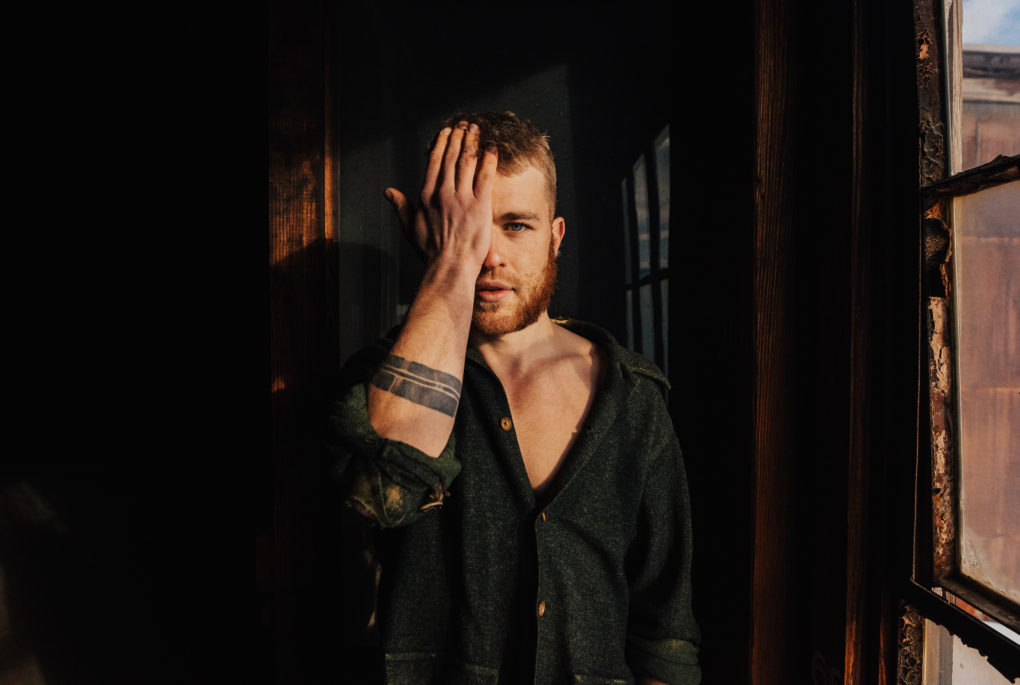

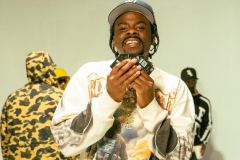
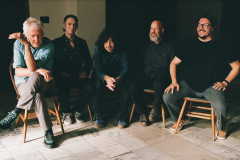
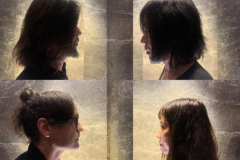
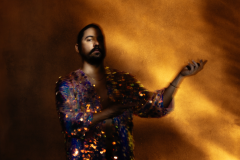

Social Media